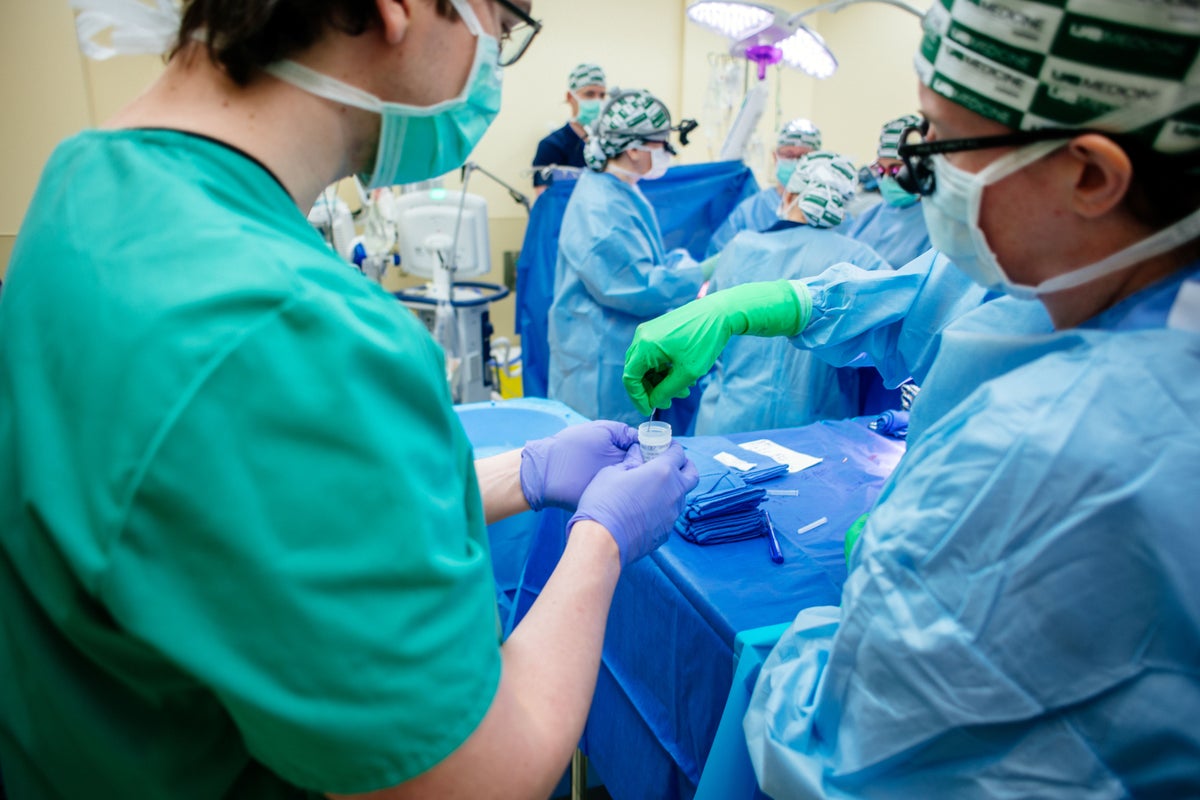
Kidneys from pigs provided “life-sustaining kidney function” after being transplanted into a brain-dead patient, researchers have found.
Kidneys were first transplanted from a genetically modified pig to a human in 2022, and scientists have gone a step further by showing they can support kidney function in someone for a week.
The development advances the promise of transplantation from one species to another, known as xenotransplantation, as a therapy to potentially cure end-stage kidney disease, researchers say.
They add that it also addresses a critical worldwide kidney organ shortage crisis.
It has been truly extraordinary to see the first-ever preclinical demonstration that appropriately modified pig kidneys can provide normal, life-sustaining kidney function in a human safely...— Dr Jayme Locke
University of Alabama at Birmingham (UAB) transplant surgeon scientist Jayme Locke is director of the university’s Comprehensive Transplant Institute in the Marnix E Heersink School of Medicine and lead author of the paper.
She said: “It has been truly extraordinary to see the first-ever pre-clinical demonstration that appropriately modified pig kidneys can provide normal, life-sustaining kidney function in a human safely and be achieved using a standard immunosuppression regimen.
“The kidneys functioned remarkably over the course of this seven-day study.
“We were able to gather additional safety and scientific information critical to our efforts to seek FDA (Food and Drug Administration) clearance of a Phase I clinical trial in living humans and hopefully add a new, desperately needed solution to address an organ shortage crisis responsible for tens of thousands of preventable deaths each year.”
The findings come 19 months after last year’s ground-breaking UAB xenotransplant research study in which genetically modified pig kidneys were successfully transplanted into a recipient after brain death.
The new study was conducted using the Parsons Model, a human brain death model developed at UAB to evaluate the safety and feasibility of pig-to-human kidney transplants, without risk to a living human.
The procedure is named after Jim Parsons, an organ donor whose family donated his body to advance xenotransplant kidney research.
This led to the first clinical grade pig kidney transplant into a human and helped pave the way for future pig kidney-to-living human transplantation.
The current research was conducted on a 52-year-old man – not named at the request of his family – who indicated to them that he wanted his body donated for research.
The patient had high blood pressure and stage 2 chronic kidney disease.
As part of the study, the man had both his kidneys removed and dialysis stopped, followed by a transplant with 10 gene-edited pig kidneys after he had been successfully cross-matched.
The transplanted pig kidneys made urine within four minutes, producing more than 37 litres in the first 24 hours.
We’re very hopeful that these data will provide further evidence that xenotransplantation is a viable and achievable solution to the organ shortage crisis— Jayme Locke
The pig kidneys continued to function as they would in a living human for the entirety of the seven-day study, the researchers said in the Jama Surgery journal.
They added that the organs were still viable at the time the study was concluded.
The kidneys came from a pig maintained in a disease-free facility.
They were flushed and packaged using the same operating procedures used in human-to-human transplantation.
They were also transported to the transplant centre and transplanted in the same way a human transplant.
Dr Locke said: “At each of those steps, we were able to test that we do have the correct standard operating procedures in place and that we’re able to operationalise this in a meaningful, safe way.
“That’s the ultimate goal. We want to achieve xenotransplant in a safe and efficacious way.
“We’re very hopeful that these data will provide further evidence that xenotransplantation is a viable and achievable solution to the organ shortage crisis that causes thousands of preventable deaths each year.
“The gap between supply and demand is that vast.”
Researchers say gene editing in pigs to reduce immune rejection has made organ transplants from pigs to humans possible, an advancement that could offer help to thousands of people who face organ failure, disease or injury.
The kidneys used in the UAB studies came from pigs with 10 genetic modifications to make the organs suitable for transplant into a human body.
According to Kidney Care UK, more than 70,000 people are being treated for kidney failure.
Around 3,000 kidney transplants take place annually but 5,500 people are still waiting.
Eight out of 10 people on the transplant list are waiting for a kidney, and the average wait is about two and a half years.
Every day one patient will die while waiting, the charity says.
The American studies are supported by United Therapeutics Corporation, which awarded a grant to UAB to launch the xenotransplantation programme.
Revivicor, a subsidiary of the company, provided the genetically modified pig that was the source of the xenotransplant kidneys, trademarked UKidney.







